This article will also be useful to those who are planning to take up search engine optimization sites and those who are not going to do this. For the first, knowing what search engines are and what they are like is extremely important in order to efficiently promote income-generating sites. For others, the information will be more likely “for general development,” which is also necessary.
So, everyone knows that the number of sites on the Internet is truly enormous and users need to somehow navigate them. Otherwise, a person will spend his whole life using only those sites that he knows, but where is the guarantee that this is the best site on the network? Initially, people simply shared links to these “best” sites with each other. Later, sites began to be organized into directories - link databases sorted by topic. With the help of directories, users could already find sites that were interesting to them, but searching for information was still very difficult. And then real search engines appeared.
Below we will talk about how the main Internet search engines work, when and how the first search engines in Russia and the world appeared, and a list will be given search engines. Now let's talk about everything in order.
Internet search engines are complex programs for searching information on network sites and a web interface for user interaction.
The software part of the search engine collects information from sites, processes texts from web pages, stores these texts in a special form, searches the stored texts and displays links to relevant pages to the user in a certain order.
A web interface is a site where the user enters his search query into a special window and receives a search result - links to found pages with a small announcement.
Search query - words entered into a search engine, for example, “list of Internet search engines.”
Relevant pages are pages that would satisfy the user’s desires, that is, they were useful to him, that is, they answered his question and gave a complete answer. Naturally, a good search engine should return only relevant pages in search results, which is why all search engines in the world are constantly improving their search engine’s search algorithms.
In what order do Internet search engines display results?
The world's search engines strive to display the most relevant pages at the beginning of the list of links, but the problem is that this process is carried out by special programs that naturally have no idea what the user wants to find. Therefore, search engines work approximately as follows: they search among their database of sites for the text of the search query, that is, the words that the user entered. The logic is simple: the more often the words entered by the user appear on the page, the more relevant the page will be to the user’s query. Of course, in reality, search engine algorithms are incredibly complex and only developers know them.
Advice to users:When you are looking for something on the Internet using a search engine, write a request, remembering that the pages in the search engine results will contain the same text. That is, if you write “how can I quit smoking at 20,” then at best the search engine will offer you a link to a forum with such a question, and not at all what you were trying to find. Search as may be written in articles useful to you.
Another problem for search engines in achieving perfect, relevant results is that users do not enter their queries accurately. For example, the user enters “TVs” and in this case it is not clear what he is looking for: a store household appliances, reviews of new models, or generally an essay about the history of television. But this is already a problem for search engines.
Now let's take a separate look at what search engines exist in the world and Russia, and also look at the list of search engines with user audience coverage as a percentage.
It was created by two Stanford University students in 1998. Their names are Larry Page and Sergey Brin. Moreover, the latter gave the name to the new search engine, making a mistake in the word Googol (the number 10 to the 100th power). Today Google is the largest search engine in the world, working with sites in 191 languages.
The largest of the Russian search systems is of course familiar to you - this is Yandex. In 2010 it exceeded 60% of the total search queries in RuNet. Also in 2010, the company launched the search engine yandex.com and thereby entered the international market.
And the general list of search engines in Russia looks something like this:
* Yandex (46.3% of Runet)
* Mail.ru (8.9% of Runet)
* Rambler (3.3% of Runet)
* Nigma (0.5% of Runet)
* Guenon (0.1% of Runet)
* Gogo.ru (<0,1 % Рунета)
*Aport (<0,1 % Рунета)
Here is a list of Russian search engines.
Updated: July 28, 2017
Hello, dear readers of the blog site. , then its few users had enough of their own bookmarks. However, as you remember, it happened in geometric progression, and very soon it became more difficult to navigate in all its diversity.
Then directories appeared (Yahoo, Dmoz and others), in which their authors added and sorted various sites into categories. This immediately made life easier for the then, not yet very numerous users of the global network. Many of these catalogs are still alive today.
But after some time, the size of their databases became so large that the developers first thought about creating a search within them, and then about creating an automated system for indexing all Internet content in order to make it accessible to everyone.
The main search engines of the Russian-speaking segment of the Internet
As you understand, this idea was implemented with stunning success, but, however, everything turned out well only for a handful of selected companies that managed not to disappear on the Internet. Almost all search engines that appeared in the first wave have now either disappeared, languished, or were bought by more successful competitors.
A search engine is a very complex and, importantly, very resource-intensive mechanism (this means not only material resources, but also human ones). Behind the seemingly simple , or its ascetic analogue from Google, there are thousands of employees, hundreds of thousands of servers and many billions of investments that are necessary for this colossus to continue to operate and remain competitive.
Entering this market now and starting from scratch is more of a utopia than a real business project. For example, one of the world's richest corporations, Microsoft, has been trying to gain a foothold in the search market for decades, and only now their search engine Bing is slowly beginning to meet their expectations. And before that there was a whole series of failures and setbacks.
What can we say about entering this market without any special financial influences. For example, our domestic search engine Nigma has a lot of useful and innovative things in its arsenal, but their traffic is thousands of times lower than the leaders of the Russian market. For example, take a look at the daily Yandex audience:
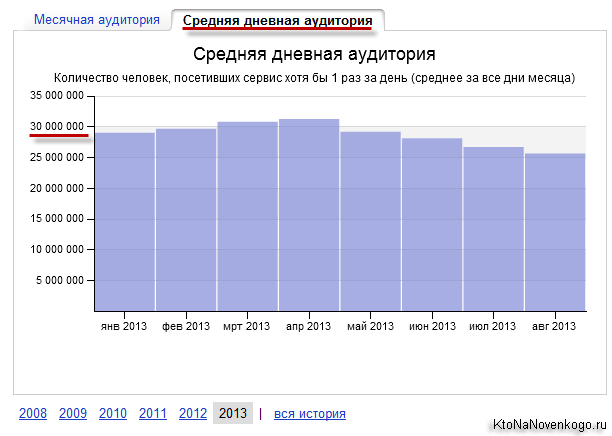
In this regard, we can assume that the list of the main (best and luckiest) search engines of the Runet and the entire Internet has already been formed and the whole intrigue lies only in who will eventually devour whom, or how their percentage share will be distributed if they all survive and will stay afloat.
Russian search engine market is very clearly visible and here, probably, we can distinguish two or three main players and a couple of minor ones. In general, a rather unique situation has developed in RuNet, which, as I understand it, has repeated itself only in two other countries in the world.
I'm talking about the fact that the Google search engine, having come to Russia in 2004, has still not been able to take leadership. In fact, they tried to buy Yandex around this period, but something didn’t work out there and now “our Russia”, along with the Czech Republic and China, are those places where the almighty Google, if not defeated, then, in any case, met serious resistance.
In fact, to see the current state of affairs among the best search engines on the RuNet Anyone can. It will be enough to paste this URL into the address bar of your browser:
Http://www.liveinternet.ru/stat/ru/searches.html?period=month;total=yes
The fact is that most of them use .
After entering the given Url, you will see a picture that is not very attractive and presentable, but it well reflects the essence of the matter. Pay attention to the top five search engines from which sites in Russian receive traffic:
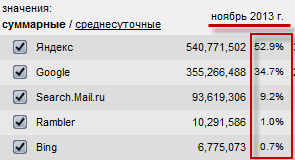
Yes, of course, not all resources with Russian-language content are located in this zone. There are also SU and RF, and general areas like COM or NET are full of Internet projects focused on Runet, but still, the sample is quite representative.
This dependence can be presented in a more colorful way, as, for example, someone did online for his presentation:
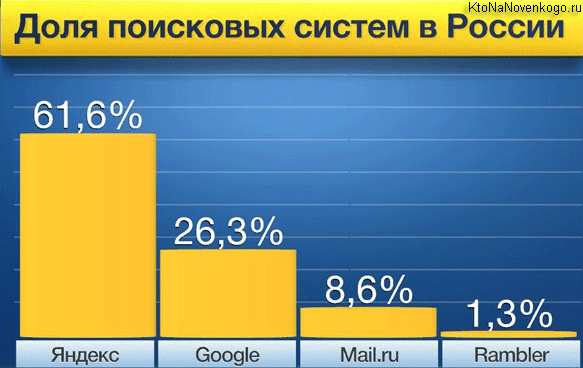
This doesn't change the essence. There are a couple of leaders and several very, very far behind search engines. By the way, I have already written about many of them. Sometimes it can be quite interesting to plunge into the history of success or, conversely, to delve into the reasons for the failures of once promising search engines.
So, in order of importance for Russia and the Runet as a whole, I will list them and give them brief characteristics:
The indexing process itself and the subsequent process of updating index databases are quite time-consuming. Although Google does this much faster than its competitors, at least Yandex, which takes a week or two to do this (read about).
Typically, a search engine breaks the text content of an Internet page into individual words, which are reduced to the basic principles, so that it can then give correct answers to questions asked in different morphological forms. All the extra stuff in the form of HTML tags, spaces, etc. things are deleted, and the remaining words are sorted alphabetically and their position in this document is indicated next to them.
This kind of thing is called a reverse index and allows you to search not by web pages, but by structured data located on the search engine servers.
The number of such servers for Yandex (which searches mainly only for Russian-language sites and a little for Ukrainian and Turkish) is in the tens or even hundreds of thousands, and for Google (which searches in hundreds of languages) - in the millions.
Many servers have copies, which serve both to increase the security of documents and help increase the speed of request processing (by distributing the load). Estimate the costs of maintaining this entire economy.
The user's request will be sent by the load balancer to the server segment that is currently least loaded. Then an analysis is carried out of the region from which the search engine user sent his request, and it is analyzed morphologically. If a similar query was recently entered in the search bar, then the user is given data from the cache so as not to overload the servers again.
If the request has not yet been cached, then it is transferred to the area where the search engine's index database is located. In response, you will receive a list of all Internet pages that are at least somewhat related to the request. Not only direct occurrences are taken into account, but also other morphological forms, as well as synonyms, homonyms, etc. things.
Their needs to be ranked and at this stage the algorithm (artificial intelligence) comes into play. In fact, the user's request is multiplied through all possible options for its interpretation, and answers to many requests are searched simultaneously (through the use of query language operators, some of which are available to ordinary users).
As a rule, the search results contain one page from each site (sometimes more). are now very complex and take into account many factors. In addition, to correct them, and are used, which manually evaluate reference sites, which allows you to adjust the operation of the algorithm as a whole.
In general, it is clear that the matter is dark. We can talk about this for a long time, but it is already clear that user satisfaction with a search system is achieved, oh, how difficult it is. And there will always be those who don’t like something, like you and me, dear readers.
Good luck to you! See you soon on the pages of the blog site How search engines work - snippets, reverse search algorithm, page indexing and features of Yandex
 How to check a site for broken links - Xenu Link Sleuth, plugin and online service Broken Link Checker, as well as search engines
How to check a site for broken links - Xenu Link Sleuth, plugin and online service Broken Link Checker, as well as search engines
 Electronic money in Russia and RuNet, as well as wallets in international payment systems Paypal - what is it, registration, replenishment of the account and how to use it, as well as how to withdraw money from Paypal in Russia Bing webmaster - center for webmasters from the Bing search engine
Electronic money in Russia and RuNet, as well as wallets in international payment systems Paypal - what is it, registration, replenishment of the account and how to use it, as well as how to withdraw money from Paypal in Russia Bing webmaster - center for webmasters from the Bing search engine
At the time of March, April and June 2015, we can see such a picture in RUNET. It is worth noting that Yandex is confidently holding first place, Google is growing and taking over the market, as analysts from Morgan Stanley predicted. At the beginning of the year, their statistics said -2.8% for Yandex, and about +5% for Google in Russia. If you look at the statistics from the counters collected by the SEO-Auditor company, then since May 2014 the Google search engine gained a little more than 6%, and Yandex lost a little less than 3%.
THE MOST POPULAR SEARCH ENGINES IN RUSSIA AT THE MOMENT OF 2015 (APRIL - JUNE)
*as of 2015 (April)
Observing this trend, it is worth saying that Google is taking a huge share in Russia thanks to mobile devices, Yandex is trying to resist, but so far not very successfully. 
As you can see, Mail.ru has lost one sixth of its share in 2014, but now everything is stable. The search engine from Rambler tried to reorganize and even rose above 2%, but now I think there will be a gradual decline. If you look at the future, the prospect will remain with Yandex and Google, but do not forget that there is another search engine that can step on the heels of both Google and Yandex. A little later we will find out which system I am talking about when we talk about search engines in the USA and the world.
Let's look at the Liveinternet statistics for June 2015.
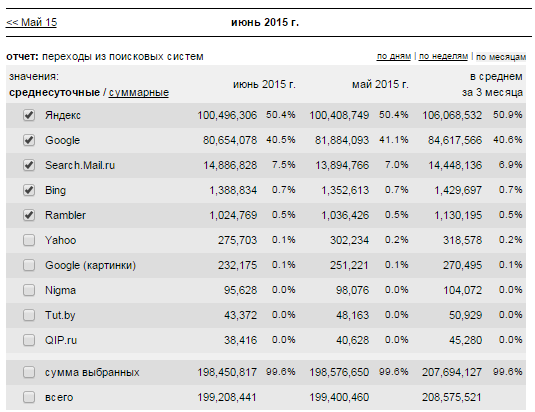
As we can see, the statistics are not very different from the graphs above: we see a slight strengthening of the positions of Yandex, Google and Mail.ru. As expected, Bing in Russia is still stagnant, and Rambler is again going “to the next world” (by the way, it was once a popular search engine on the RuNet).
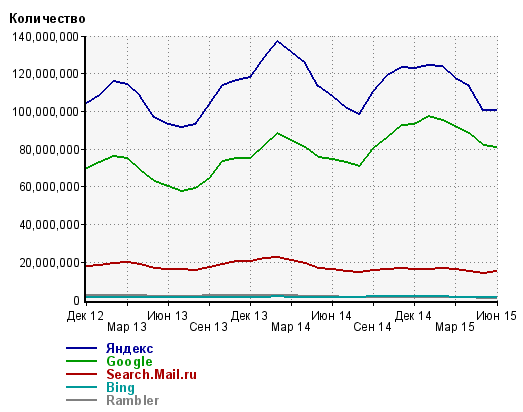
Dynamics of queries in popular search engines in Russia as of 2015 (June)
By the way, there are several conclusions on the topic of the development of search engines for SEO optimizers. Google's growth will continue and there are two significant factors:
- The generation from 10 to 16 years old uses Google’s search engine more, which means that after some time, with the shift in generations, the growth of Google’s audience will increase
- Following from the first argument, we see the growth of mobile devices, and they already make up about 20-30% of total traffic. Following this, Google’s traffic will increase, since the popularity of this search engine on mobile devices is higher than that of Yandex. Don't forget such a factor as the Android OS...
All this suggests that if the situation does not change for the better for Yandex in the next three or four years (and maybe faster), Google will take the lead among Russian search engines. This means that an SEO optimizer should optimize your sites not only for Yandex, but also for Google. After all, it’s better to look to the future and be prepared than to be the last to jump on board. Perhaps our forecasts are subjective, but these are the statistics collected by analysts from.
THE MOST POPULAR SEARCH ENGINES IN THE USA AS OF 2015
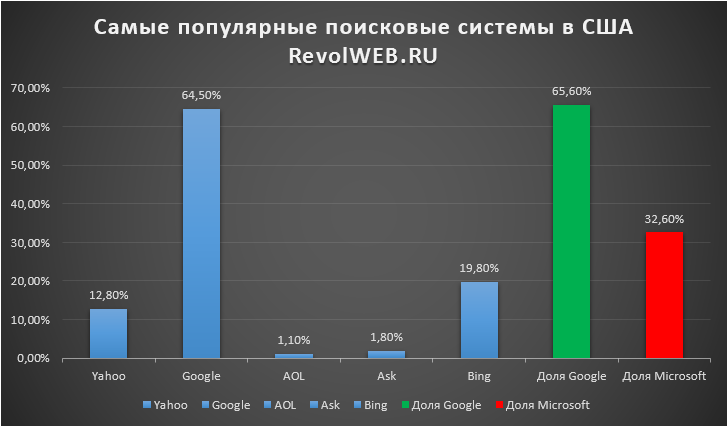
*as of 2015
The graphs show search engines (namely sites): Google, Bing, Yahoo, Ask and AOL. On the right is the total share, because Yahoo is now in an alliance with Bing and that means the total share of Microsoft’s brainchild is about 33%. Google uses AOL and Google's total market share is about 66% of the market
Which search engines are the most popular in Russia and the world? The article contains a detailed list of the best search engines and their market shares at the end of 2016.
Rating of the most popular search engines in the world
Here are data from research company NetMarketShare as of May 2016. The table contains the most popular search engines, and the percentage of the total number of PC user requests that they process:
For clarity, here is a pie chart
Popularity of search engines among personal computer users.
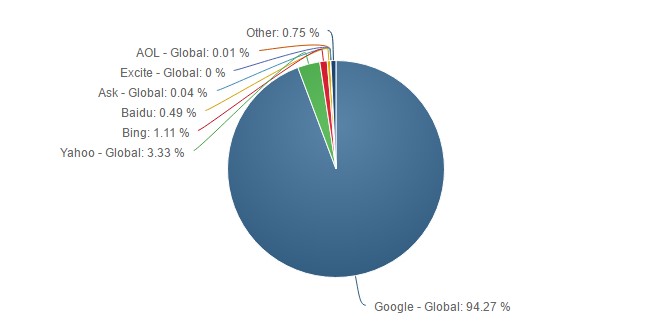
Popularity of search engines among mobile device users.
Obviously, the most popular search engine in the world at the moment is Google. It occupies a very significant share of the desktop market, and for mobile devices Google is essentially a monopolist.
Moreover, over the past year, Google has only strengthened its position on PCs from 65.44% at the beginning of the year to 75.97% at the moment.

The preferences of mobile device users have remained almost unchanged this year. At the beginning of the year, Google had 94.13%, and now it is 94.27%

List of the most popular Russian-language search engines
Here are the five best search engines on RUNet 2016 according to Liveinternet:
- Yandex – 48.3%;
- Google – 45.1%;
- Mail – 5.7%;
- Rambler – 0.4%;
- Bing – 0.3%.
The statistics take into account personal computers and mobile devices together.
Thus, Yandex is one of the few search engines that has withstood the expansion of Google and has not lost its position in the domestic market.
Two more Russian companies made it into the top five – Mail and Rambler. They take 3rd and 4th places respectively.
Here is an expanded list of the most common Russian-language search engines.
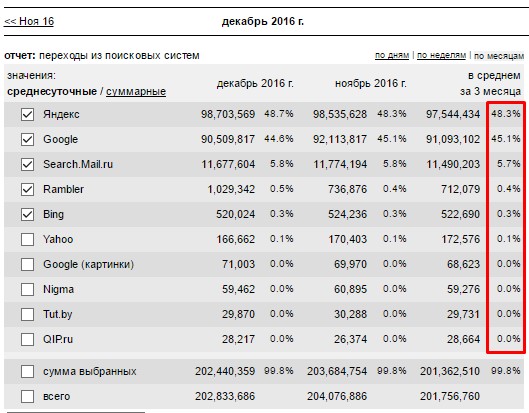
And here is a graph of the dynamics of changes in the number of requests processed by the main search engines:
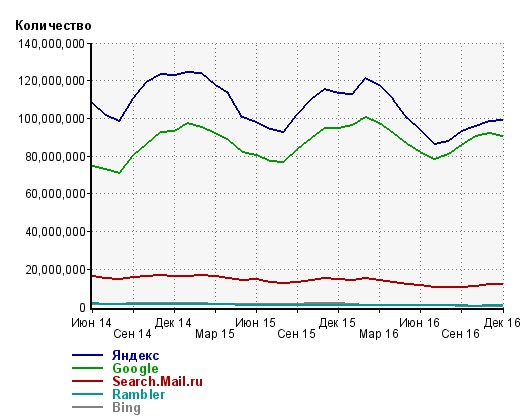
Change in popularity in Russia
Brief history of Yandex
Yandex is the largest domestic search engine. Founded on September 23, 1997. Recently, Yandex has been actively expanding to the international level and already has localized versions of the service in Ukraine, Kazakhstan, Belarus and Turkey.
In addition to search, Yandex provides many additional features: postal service, Yandex maps, Yandex Direct advertising network, Yandex Money, Yandex Taxi, Yandex market, etc. In addition, Yandex is actively promoting its own browser.
In 2011, a new machine learning method, Matrixnet, was developed and implemented, which significantly improved the quality of search.
In addition, in 2011, Yandex placed shares on the American high-tech exchange Nasdaq, which is a landmark event for domestic Internet companies.
In December 2012 A new algorithm “Kaliningrad” was introduced, which made the search personalized. This means that now the main ranking factor is the user himself, who creates a query for the search engine. In other words, search results for the same question for two different users will now differ depending on the needs and preferences of the users themselves. This is a new step in the evolution of search engines.
In 2013 In Yandex Market, it became possible to buy goods directly, without going to the store’s website. The company acquired the Kinopoisk website for $80 million.
In 2016, the company launched the Yandex Taxi service.
In addition, among the innovations of Yandex one can note:
- introduction of geo-dependence of requests depending on the regional affiliation of the user and the site;
- taking into account behavioral factors;
- development of a mechanism for hints, error correction and abbreviation recognition;
- active fight against selling links and over-optimized texts;
- introduction of personalized search;
- taking into account the added semantic value of the site.
A Brief History of Google
A generally recognized leader among search engines. The search engine appeared in 1996, and was originally intended to search the Stanford library's filing cabinets. Google Corporation was founded in 1998.
Currently it has more than 100 regional versions in different countries. In addition, Google is not only a search, but also more than 50 different services, including the most popular browser Google Chrome.
Despite all the capabilities of popular search engines, they cannot solve all problems. In particular, they are not always convenient to use for searching for scientific information. There are special ones for these purposes.
The best Internet search engines. Internet search engine – These are special search programs installed on a whole range of specialized machines. In simple terms, it’s the same website with a set of programs, only on a special search engine (server). It is with the help of search engines that you find all the information you need. There are a lot of search engines.
1. What is an Internet search engine
2. Popular search engines in our country
3. Popular search engines abroad
4. Unusual search engines
5. How to properly search for information on the Internet
The most best psearch systems in our country:
http://www.yandex.ru

http://www.google.com

http://www.aport.ru
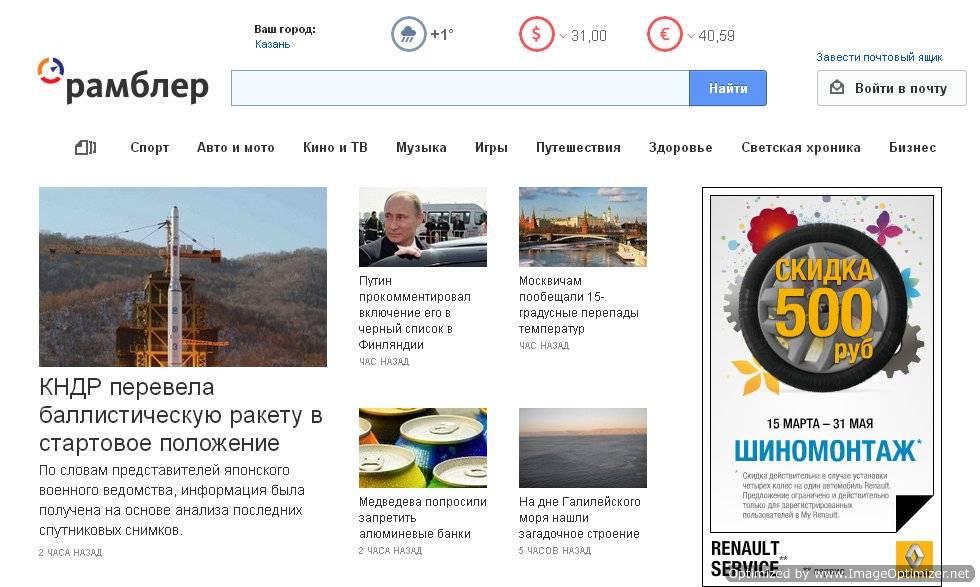
http://www.rambler.ru/

http://go.mail.ru

http://www.webalta.ru/
The most unloved and intrusive search engine by all.
Popular search engines abroad
http://www.altavista.com
http://www.alltheweb.com
http://www. bing.com
http://www.google.com
http://www.excite.com
http://www.lycos.com
http://www.mamma.com
http://www.yahoo.com
http://www.dmoz.com
http://www.hotbot.com
http://www.dogpile.com
http://www.netscape.com
http://www.msn.com
http://www.webcrawler.com
http://www.jayde.com
http://www.aol.com
http://www.euroseek.com
http://www.teoma.com
http://www.about.com
http://www.ixquick.com
http://www.lookle.com
http://www.metaeureka.com
http://www.searchspot.com
http://www.slider.com
http://www.allthesites.com
http://www.clickey.com
http://www.galaxy.com
http://brainysearch.com
http://www.orura.com
Each country has its own popular search engines.
Unusual search engines
- DuckDuckGo (https://duckduckgo.com/) - a hybrid search engine with a privacy policy for the user and his search queries.
![]()
- TinEye (http://tineye.com/) is a search engine specializing in searching images on the Internet. It has recently lost its relevance after Google introduced the same function in its image search.
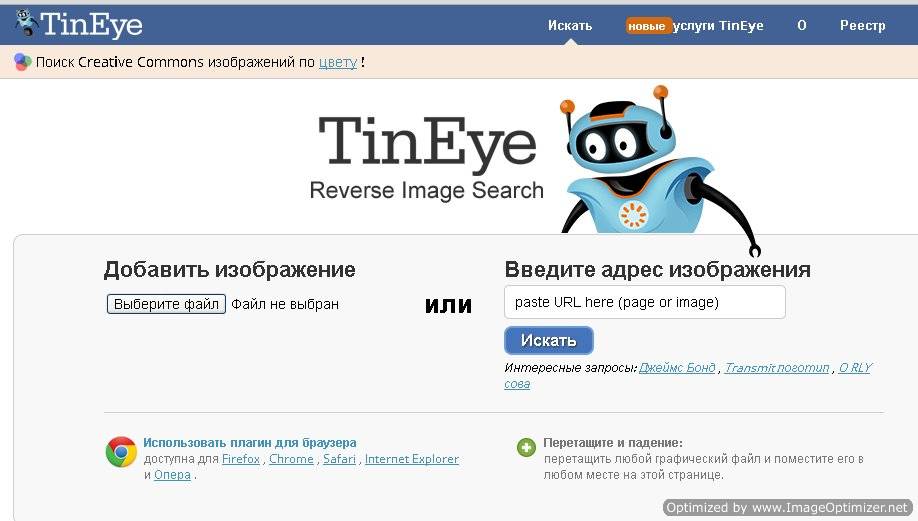
- Guenon (http://www.genon.ru/) is a search engine that collects and creates content on its website.
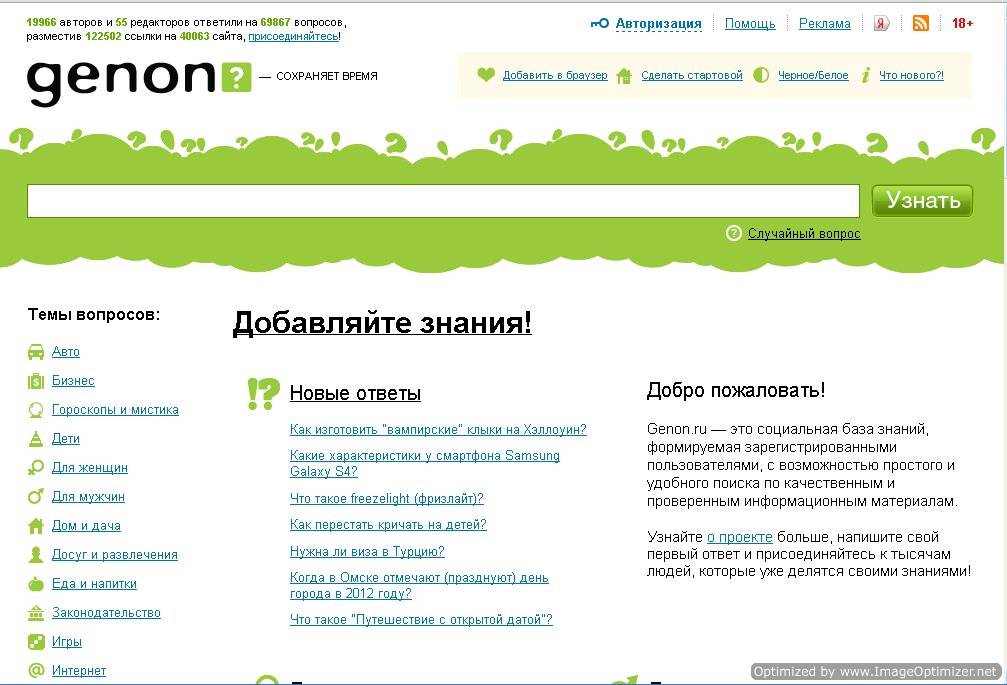
In almost every search engine, in addition to the search box, there are links to the most popular news sites, and sites of certain subjects.
How to properly search for information on the Internet
Each search engine has its own algorithms (rules) for searching for information.
In order to find some information on the Internet through a search engine, you need to enter in the search field request. If you enter one word, then this request will give you thousands of links to sites where this word is mentioned.
Therefore, it is necessary to enter as specific a query as possible, consisting of two, three or more phrases.
Let's look at an example of a search engine query Yandex.
Let's say you want to find information on buying a computer. If you write one word in the search box “ Computer", then you will get 133 million answers

You need to ask a more specific request. It is better to indicate which computer you want to buy and where (in which city).
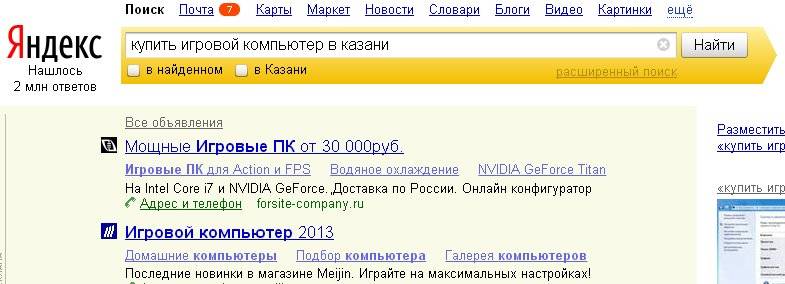
Then the search engine will give you much fewer answers to your query.
The search engine doesn’t care at all whether you enter your query in capital or small letters.
Yandex distinguishes between nouns and adjectives, but completely ignores endings.
He is also completely indifferent to cases, plurals and the like.
To make the search more accurate, you need to put the query in quotation marks or put an exclamation point in front of the word.

Now look at the same query, but without the exclamation marks.

Do you see the difference? With exclamation marks, the number of responses is not 2 million, but 186 thousand.
If you put an exclamation point in front of a word with a capital letter, you will be given answers in which this particular word with a capital letter occurs.
If the word is in the nominative case, and you need information on exactly such a word, and exactly as you wrote it, then put two exclamation marks in front of this word. For example: !!Ball .
The search will give you answers for exactly this word " Ball" the way you wrote it. Not " ball", Not " balls", and with a capital letter.
If you write a phrase with the word " on", then Yandex will ignore " on" For example: " on the shelf" The search will only be performed using the word " shelf ».
In order for him to take it into account and not ignore it, it is necessary before the word “ on» put a plus sign – « +on ».
Each search engine has its own search algorithm, so if you use a specific search engine and want to learn how to correctly compose queries, then you just need to type “ search rules inGoogle " or " search rules in Yandex ", follow the link to the response to your request and read the necessary information.
